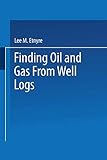Finding oil and gas from well logs Libro electrónico Lee M. Etnyre
Tipo de material: Libro
en línea Idioma: Inglés Detalles de publicación: New York, New York, United States Van Nostrand Reinhold c1989Descripción: xi, 305 páginas ilustraciones 24 centímetrosISBN:
Libro
en línea Idioma: Inglés Detalles de publicación: New York, New York, United States Van Nostrand Reinhold c1989Descripción: xi, 305 páginas ilustraciones 24 centímetrosISBN: - 0442223099
- 9781475752328 (Print)
- 9781475752304 (Online)
- Disponible en línea
Incluye bibliografía e índice: páginas 297-305
1. Well log basics.. 2. Porosity and saturation.. 3. Formation factor and water saturation.. 4. Borehole acoustic waveform logging.. 5. Electrical properties (induction logging.. 6. Electrical properties (focused current and spontaneous potential logging.. 7. Radioactivity logging.. Index
Disponible para usuarios de ECOSUR con su clave de acceso
Several excellent books on weil log interpretation have already been published. However, I feel that these books do not place enough emphasis on the inherent uncertainties in tool responses or on the related and very practical problern of selecting suitable data points for statistical or quantita tive calculations. Thus, I have written this book not only to introduce the newcomer to this very complex art and science, but also to provide him or her with the necessary tools to produce better interpretations. The problems at the end of each chapter are essential to a more complete understanding of the subject matter and include many practical notes based on problems I have encountered in actual applications. This book emphasizes that you develop your own concepts and understanding of the underlying principles, rather than acquiring a compendium of knowledge based on certain rules of thumb. If you are to successfully interpret welllogs, you need to be able to apply your knowledge to new problems that may not follow the preconceived ideas and approaches you would follow if you approached weil log analysis from a cookbook standpoint. Inglés
Disponible en línea
Disponible en formato PDF


